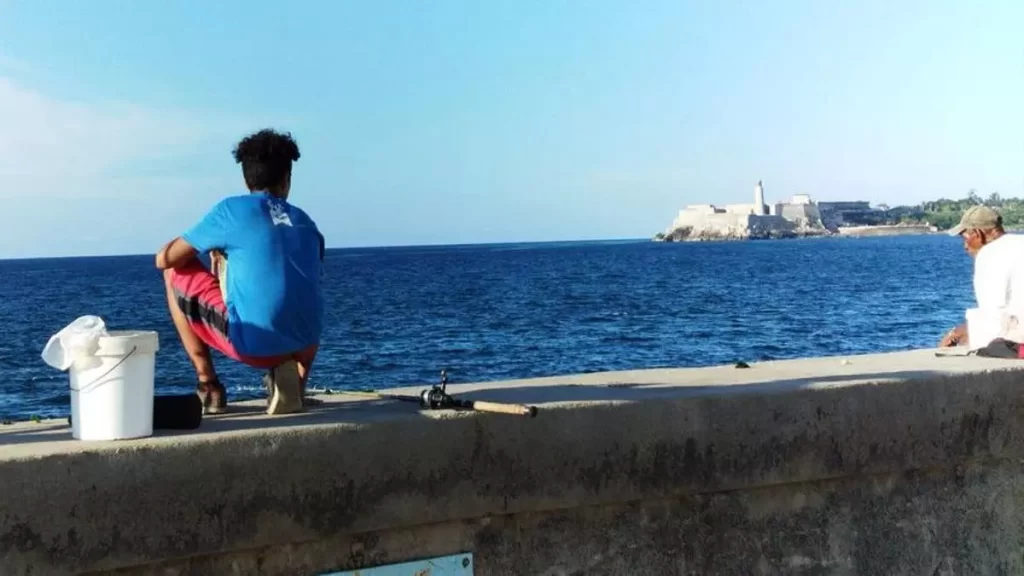
![]() 14ymedio, Havana, March 5, 2024 — The Government has definitively eliminated the obligation for private fishermen to contract with a State company authorized for commercialization to receive a fishing license. This resolution, published on Monday in the Official Gazette, is a measure that was taken provisionally in 2022, but it leaves out the star product of the Cuban seas: the lobster.
14ymedio, Havana, March 5, 2024 — The Government has definitively eliminated the obligation for private fishermen to contract with a State company authorized for commercialization to receive a fishing license. This resolution, published on Monday in the Official Gazette, is a measure that was taken provisionally in 2022, but it leaves out the star product of the Cuban seas: the lobster.
The text details that the species that can be freely fished are “fish, tuna, oysters, clams, crab and marine shrimp, in this case, outside the coastal lagoons, in the waters of the Island platform.” Meanwhile, marketing must be subject to the decisions of local governments in each case, and there will be a “quarterly reconciliation process” between the National State Inspection Office and the fishermen on the catches made by delivering an affidavit.
The current resolution puts an end to the limbo in which the fishermen had remained since the beginning of 2024, since the previous one ended on December 31, 2023. That document was received with enthusiasm at the time by the population, who did not cease to point out the delay in relaxing some limitations that, in their opinion, tied the hands of thousands of workers in the fishing sector. The consequence was the unprecedented situation of barely any fish to eat in a country surrounded by the sea.
But despite this good step, the faint liberalization has not had any visible effect in the year and a half that it has been approved. According to data from the Ministry of Food, fish consumption in Cuba fell from an annual average of 39.7 pounds per capita three decades ago to about 8.4 pounds per capita in 2022. The figures for 2023 are still unknown, but nothing predicts that they are positive.
The sector will not recover the levels of production experienced in the 1990s, when Cuba extracted 100,000 tons of fish from international waters
Although the fishermen have been warning for years that the State pays them – like farmers – little and late, officials have almost exclusively attributed the fall of the fishing sector to the deficiencies of the fleet. “Between 1976 and 1990 we had a fleet that fished in international waters. Cuba thus received about 100,000 tons of fish annually. From 1992 there was a gradual withdrawal of this fleet, and in 2002 we had practically no active fleet,” said the deputy minister at a Round Table in the middle of last year.
Shortly before, in December 2021, Ariel Padrón Valdés, director of Fisheries Regulations and Sciences of the Ministry of the Food Industry, warned that the sector will not recover the levels of production experienced in the 90s, when Cuba extracted 100,000 tons of fish from international waters, more than 70,000 from Cuba and 33,000 imported.
Faced with this scenario, the authorities have chosen to resort to aquaculture, but the deterioration has also reached this modality. In 2022, the province of Sancti Spíritus barely reached 57% of the expected production due to the lower presence of species, the shortage of fuel to carry out the extraction work and the lack of maintenance of the dams.
The liberalization of the sector may not be working due to the low State payments, ridiculous if compared to what a private company offers. In a report published by this newspaper in January, several fishermen from Manzanillo (Granma) said that the Fishing Combine pays less than 2,000 pesos for each ton of fish caught; that is, less than one peso per fish. “This forces us to sell to private individuals, who buy it from us at 200 pesos per pound. Then they resell it.” Others, they added, manage to do “a good business with some owner of a private company, who buys their whole catch.”
Meanwhile, the lobster and pink shrimp – which will continue to be subject to current regulations – are an extraordinary source of foreign exchange for the State, and fishing companies, such as Santa Cruz del Sur, in Camagüey, tend to catch even more than expected. In 2019, the Government of Cuba earned 63 million dollars per year for the export of lobster and shrimp, the last year for which a figure is available.
Translated by Regina Anavy
____________
COLLABORATE WITH OUR WORK: The 14ymedio team is committed to practicing serious journalism that reflects Cuba’s reality in all its depth. Thank you for joining us on this long journey. We invite you to continue supporting us by becoming a member of 14ymedio now. Together we can continue transforming journalism in Cuba.
